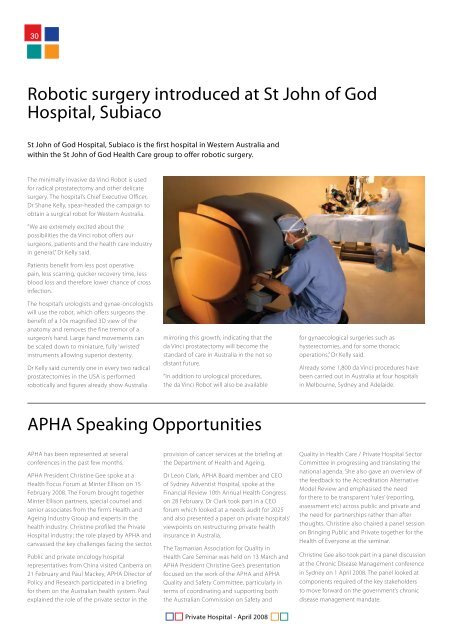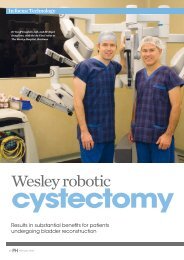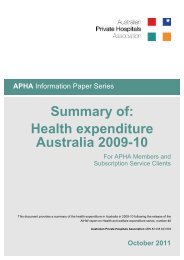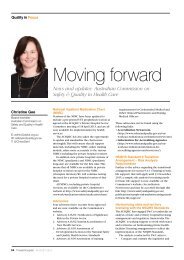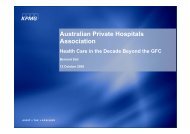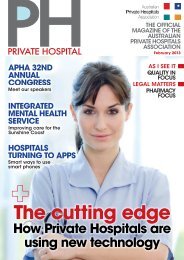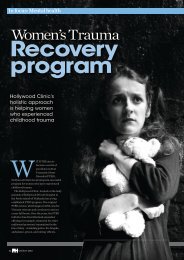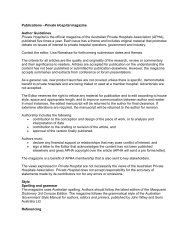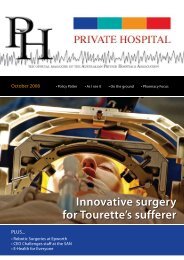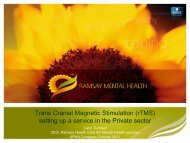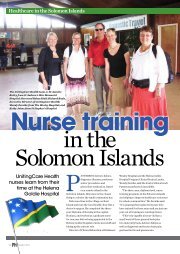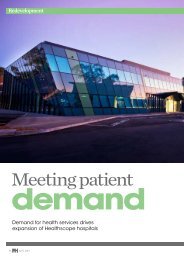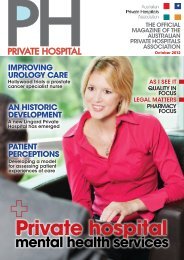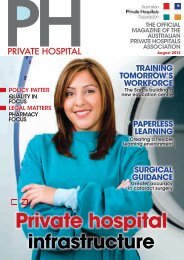INNOVATION & TECHNOLOGY ON SHOW AT HOSPIMedica ...
INNOVATION & TECHNOLOGY ON SHOW AT HOSPIMedica ...
INNOVATION & TECHNOLOGY ON SHOW AT HOSPIMedica ...
Create successful ePaper yourself
Turn your PDF publications into a flip-book with our unique Google optimized e-Paper software.
30<br />
Robotic surgery introduced at St John of God<br />
Hospital, Subiaco<br />
St John of God Hospital, Subiaco is the first hospital in Western Australia and<br />
within the St John of God Health Care group to offer robotic surgery.<br />
The minimally invasive da Vinci Robot is used<br />
for radical prostatectomy and other delicate<br />
surgery. The hospital’s Chief Executive Officer,<br />
Dr Shane Kelly, spear-headed the campaign to<br />
obtain a surgical robot for Western Australia.<br />
“We are extremely excited about the<br />
possibilities the da Vinci robot offers our<br />
surgeons, patients and the health care industry<br />
in general,” Dr Kelly said.<br />
Patients benefit from less post operative<br />
pain, less scarring, quicker recovery time, less<br />
blood loss and therefore lower chance of cross<br />
infection.<br />
The hospital’s urologists and gynae-oncologists<br />
will use the robot, which offers surgeons the<br />
benefit of a 10x magnified 3D view of the<br />
anatomy and removes the fine tremor of a<br />
surgeon’s hand. Large hand movements can<br />
be scaled down to miniature, fully ‘wristed’<br />
instruments allowing superior dexterity.<br />
Dr Kelly said currently one in every two radical<br />
prostatectomies in the USA is performed<br />
robotically and figures already show Australia<br />
mirroring this growth, indicating that the<br />
da Vinci prostatectomy will become the<br />
standard of care in Australia in the not so<br />
distant future.<br />
“In addition to urological procedures,<br />
the da Vinci Robot will also be available<br />
APHA Speaking Opportunities<br />
APHA has been represented at several<br />
conferences in the past few months.<br />
APHA President Christine Gee spoke at a<br />
Health Focus Forum at Minter Ellison on 15<br />
February 2008. The Forum brought together<br />
Minter Ellison partners, special counsel and<br />
senior associates from the firm’s Health and<br />
Ageing Industry Group and experts in the<br />
health industry. Christine profiled the Private<br />
Hospital industry; the role played by APHA and<br />
canvassed the key challenges facing the sector.<br />
Public and private oncology hospital<br />
representatives from China visited Canberra on<br />
21 February and Paul Mackey, APHA Director of<br />
Policy and Research participated in a briefing<br />
for them on the Australian health system. Paul<br />
explained the role of the private sector in the<br />
provision of cancer services at the briefing at<br />
the Department of Health and Ageing.<br />
Dr Leon Clark, APHA Board member and CEO<br />
of Sydney Adventist Hospital, spoke at the<br />
Financial Review 10th Annual Health Congress<br />
on 28 February. Dr Clark took part in a CEO<br />
forum which looked at a needs audit for 2025<br />
and also presented a paper on private hospitals’<br />
viewpoints on restructuring private health<br />
insurance in Australia.<br />
The Tasmanian Association for Quality in<br />
Health Care Seminar was held on 13 March and<br />
APHA President Christine Gee’s presentation<br />
focused on the work of the APHA and APHA<br />
Quality and Safety Committee, particularly in<br />
terms of coordinating and supporting both<br />
the Australian Commission on Safety and<br />
Private Hospital - April 2008<br />
for gynaecological surgeries such as<br />
hysterectomies, and for some thoracic<br />
operations,” Dr Kelly said.<br />
Already some 1,800 da Vinci procedures have<br />
been carried out in Australia at four hospitals<br />
in Melbourne, Sydney and Adelaide.<br />
Quality in Health Care / Private Hospital Sector<br />
Committee in progressing and translating the<br />
national agenda. She also gave an overview of<br />
the feedback to the Accreditation Alternative<br />
Model Review and emphasised the need<br />
for there to be transparent ‘rules’ (reporting,<br />
assessment etc) across public and private and<br />
the need for partnerships rather than after<br />
thoughts. Christine also chaired a panel session<br />
on Bringing Public and Private together for the<br />
Health of Everyone at the seminar.<br />
Christine Gee also took part in a panel discussion<br />
at the Chronic Disease Management conference<br />
in Sydney on 1 April 2008. The panel looked at<br />
components required of the key stakeholders<br />
to move forward on the government’s chronic<br />
disease management mandate.


